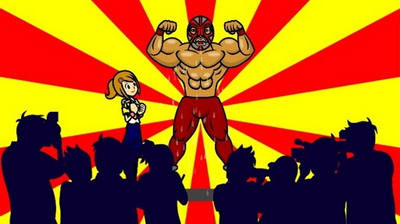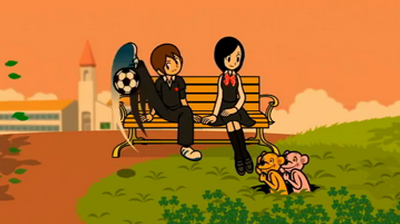| Rhythm Heaven Fever Wii Published by Nintendo Released: 2012/02/13 Reviewed: 2012/02/15
|
| . | Now in its sixth and final year before its successor appears, it may not be all that surprising that the Wii's selection of games in 2012 is appearing a little slim. However, it includes a handful of quality exclusive titles, many developed or published by Nintendo themselves, including the ninth iteration of Mario Party and at least two of the "Operation Rainfall" trio of RPGs - including the critically acclaimed Xenoblade Chronicles, and (the possibly aptly-named) The Last Story, to show that The Legend Of Zelda: Skyward Sword isn't the Wii's last hurrah. A game that shouldn't be overlooked is the charming and quirky Rhythm Heaven Fever. In the same series as the 2008 DS game Rhythm Heaven and the Japan-only GBA/arcade game Rhythm Tengoku, it continues the franchise's WarioWare-esque brand of weirdness in scenarios where matching button presses to music is the name of the game. Yes, it sounds rather basic. You either press the A button, or the A and B buttons together, to perform a certain action, timing it to the music as you follow visual and auditory cues. But like many deceptively simple games, you may find yourself at the game's mercy as you try to master it, because unless you have an innate sense of rhythm, this is by no means an easy game to master. There are over fifty scenarios/minigames, and the first few seem cute enough - a monkey and a mandrill teach you how to golf in "Hole In One", where you must press the A at the right moment to hit a golf ball as it is thrown at you. Then in "Screwbot Factory", you press A and B together to screw on these robots' heads, but you have to press and hold them down for the right amount of time. After inspecting a see-saw in "See-Saw" and kicking away balls in "Double Date", you may think you've got the hang of it, but then you come across "Remix 1".
The Remixes are where the game gets interesting. After each set of four minigames, you have to put what you've learned to the test as you go through a longer song, made from a number of segments, usually based on the minigames you just played. One second you're hitting a ball, the next you're jumping an a see-saw, and then here come the Screwbots again! The visuals are usually changed for the Remixes to, well, mix things up a bit. The Remixes are not quite as random as the barrage of "microgames" in the WarioWare series, but it is definitely more frantic. Luckily, it's musically coherent, but the game soon becomes less forgiving, as you will find out long before you make it to Remix 10 - if you even make it that far. Besides attempting to pass each musical minigame with a "Superb" rating, you will be randomly given an opportunity to go for a Perfect Medal on each one, whereby you can't miss a single beat. If you let the game consume you - and it certainly can - it will probably take you several attempts before you get all the Perfect Medals, especially on the longer Remixes. The single-player mode is certainly solid. Just like it says on the back of the box, it's "[h]ilarious to play or just watch!" But if a second person wants to play, eight of the minigames are also adapted into two-player versions. These present the same kind of challenges as before, but now in a co-operative yet competitive format. You will each have your own score out of 100, and these are added together along with a "Compatibility Score" to see if you have enough points to unlock the next two-player game. The game seems a bit more forgiving here, and though there are Medals to get here, there are no Perfect Medals to be earned (perhaps thankfully to save a player who makes an error from the other's wrath if the potential frustration experienced in the one-player mode were to exist here too). Earning Medals and Perfect Medals unlock various things, from that stage's music, amusing texts to read in the Café, "Rhythm Toys", "Extra Games", and "Endless Games", the latter of which includes some two-player games. Sadly, aside from unlocking music, most of the unlockables aren't that great...but having those Medals really feels like an accomplishment, and so you may still strive to earn them all. Sure, it may be frustrating, but you can't not be having fun along the way with all the catchy tunes and cute, colourful images.
This is a quirky game, with the kind of quirkiness that seems to be associated with Japan. Since there isn't much text, I had also played the Japanese version since summer. It wouldn't be worth importing just for the sake of the cuteness of the original "Engrish" (i.e. the "Cheer Readers", or "Book Girls" as they were known as, now say "It's up to you!" instead of the endearing "Hey! You Can Do!") - but it highlights a surprisingly good localization by Nintendo of America. Besides the "Engrish", the only other casualty are the "Manzai Birds". In their Endless Game, two birds perform a comedy routine, where one slaps the other when he loses control. It was probably deemed too culturally-specific, so it was replaced with "Mr. Upbeat", where a character from the original GBA game steps in time to avoid tripping over a metronome hand. A sad replacement, but overall, not a huge loss. If you want to play something that is simple to play yet challenging to master, with a solid single-player experience that is enjoyable even for spectators, Rhythm Heaven Fever is recommended if you have at least some rhythmic skill. And considering that it is sold at a discounted price, it makes it more worth your dollar. Before you tackle the serious epics of Xenoblade Chronicles or The Last Story later this year, you might as well embrace the sheer fun that the Wii represents, and Rhythm Heaven Fever is a great example of that. | . | ||||

